Top 15 Free Task Management Software for Small Companies
-
Kate Borucka
- 2024-02-23
- 17 min read
Effective task management is a challenge not only in big companies, where it’s obviously difficult to stay in control of the workflow without the help of software but also in small businesses.
Small companies, in particular, need tools that can streamline their processes without breaking the bank. That’s where free task management software comes into play. Here’s your short guide on the best project management software for small companies.
What Is Task Management Software Used for?
In smaller teams there are also situations like misunderstandings or lack of communication, that can make work hard and ineffective. And more so—even if you work alone, you still need to manage multiple tasks and remember so many things like due dates that it’s just much easier not to rely on your memory alone.
Even though it might seem that a small team can handle daily tasks without any assistance, it’s very difficult to actually have everything in check without any software at all.
Here’s how you can use task management software tools for your small business:
- Managing projects and task organization. The right software will help your small company organize all projects and people and complete tasks on time.
- Project planning and scheduling of work with resource distribution, prioritization, setting and monitoring deadlines, and making sure your sticking to the budget.
- Communicating and collaborating with other team members, stakeholders, and all people involved in projects.
- Time tracking—the best task management tools offer a feature of time tracking or integrations that let your team work on their time management skills.
- A unified hub for all your business activities. Task management software helps to keep all important information about your company, projects, and employees in one place without the need to switch between different tools.
Streamline Projects with TimeCamp Planner!
Elevate teamwork and management with TimeCamp Planner all-encompassing features.
Why Is Task Management Software Important?
Good task management will help you and your team handle your daily tasks and long-term projects, at the same time increasing your productivity. Even in a small team, it’s very important that everyone is on the same page and has all the information they need to work on their tasks.
For instance, if you’re a content marketing manager, task management software will make it much easier for you to streamline your operations, from big marketing projects like explainer video campaigns and creating a website to smaller ones like updating blogs.
So, you don’t have to waste your time organizing sticky notes or long to-do lists anymore. That’s exactly what task management tools ensure. They also make assigning tasks extremely easy. Instead of writing long emails or explaining what needs to be done in detail, use a task management tool. Managing the workflow will become much easier and more efficient.
The Main Advantages of Task Management Software
Good task management software brings many benefits to small businesses:
- As small companies grow, their task management needs evolve. The best task management software solutions are designed to scale with your business. They offer upgrade options for additional features, ensuring that you can adapt as your company expands.
- You don’t need to remember every task, due date, or coworker to include—you’ll get appropriate notifications from the software so you can focus on the project.
- Practically in every task management app, you can assign tasks to team members without worrying, that this information will get lost in their overloaded inbox.
- Easy-to-use software will help you save time by facilitating document sharing, communication, real-time collaboration, time tracking, etc.
- Good task management solution will provide features like Kanban boards, calendars, recurring tasks, or online task sharing that will make project management easier and more transparent.
- Cloud-based solution allows teams to access their tasks and projects from anywhere with an internet connection. This accessibility promotes remote work and flexibility, essential factors in today’s business landscape.
How to Choose the Right Task Management Software?
It can be difficult to choose the right task management system from all the options available on the market. There are, however, a few key factors that you can consider when looking for the right tool.
1. User-Friendly Interface
Opt for software with an intuitive interface that doesn’t require extensive training. Quick adoption is crucial for small businesses looking to boost productivity immediately. A steep learning curve is often the main reason for employees not wanting to use the software, even if it’s the best task management tool out there.
2. Collaboration Features
Look for tools that facilitate collaboration among team members. Features like shared task lists, real-time updates, and comment threads can enhance teamwork and communication.
3. Integration Capabilities
Consider software that integrates seamlessly with other business applications you use. Integrations with email, calendars, and project management tools can streamline workflows and save time.
4. Customization Options
The ability to customize the software to your company’s specific needs is vital. Look for software that allows you to create custom workflows, templates, and task categories.
5. Mobile App Availability
In today’s mobile-driven world, having a mobile app for your task management software is a must. It ensures that team members can access and update tasks on the go, wherever they are.
The Best Free Task Management Software for Small Companies
Here’s a comprehensive list of the best task management tools. Seemingly similar, remember that they differ in their purpose and features, so choose the one that best corresponds to your business needs.
1. TimeCamp Planner
Best for: cross-team collaboration and seamless task management
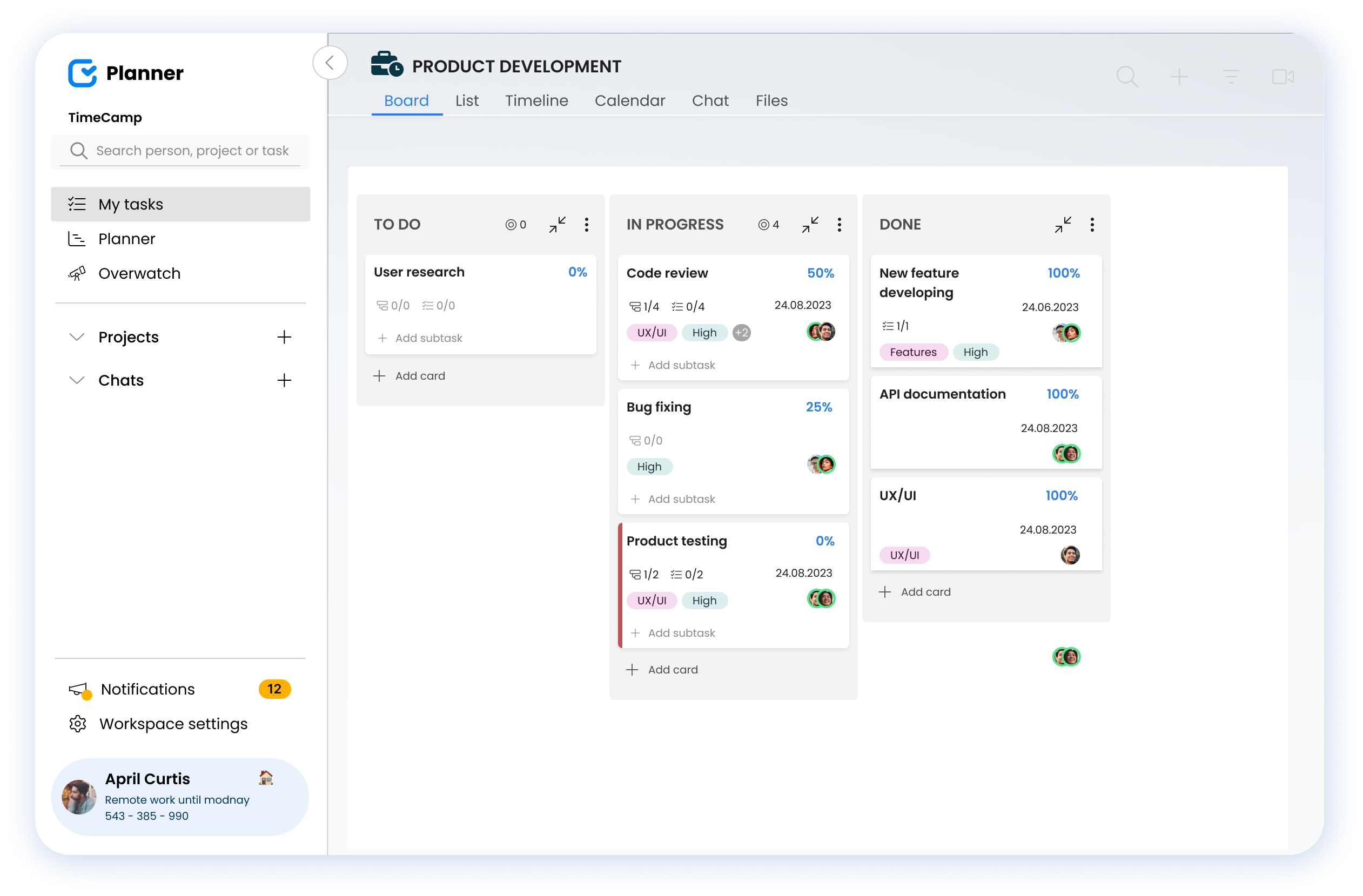
TimeCamp Planner is a two-in-one tool for task management and communication. It’s free for up to 5 members, so it’s perfect for small teams that need assistance in handling their daily tasks and small projects. You can create as many spaces as you wish, as the number is unlimited, even in the free plan.
At the same time, TimeCamp Planner greatly facilitates real-time communication and will significantly reduce the number of emails you send every day. And all that in one place! You can also use TimeCamp Planner as a personal tasks manager to make your work more organized and use it as your assistant.
Main features:
- A user-friendly, intuitive interface with no steep learning curve makes it easy to move around the app.
- You can create your own task structure in every space for different projects.
- Some more advanced features include tags, checklists, recurring tasks, custom task statuses and priority levels.
- TimeCamp Planner offers simple solutions with rich visualization features—a digital planner with a calendar, Gantt chart with timeline, estimates, board view, Kanban boards, and to-do lists.
- You can set start and due dates, assignees, and estimates, quickly make a video call, or organize a team meeting to monitor project progress.
- Project chats and individual conversations, notifications with @mentions, file sharing, chatting directly in a task, or making a video call.
- The free plan offered by TimeCamp Planner also helps in daily collaboration with your clients, allowing you to invite up to five guests from outside your organization and give them access to particular spaces.
Integrations: TimeCamp Planner offers a few vital integrations: with Trello, Google Hangouts, Calendar, Gmail, Zapier, Make, and TimeCamp for effortless time tracking.
Available for: web, mobile (iOS only) and desktop (Windows, Linux, macOS).
Pricing: Free plan is available for up to 5 users; Pro plan is $2.99 per user per month, billed annually ($3.99 billed monthly).
Use TimeCamp Planner to keep project management under control
Discover comprehensive features tailored for every stage of team collaboration.
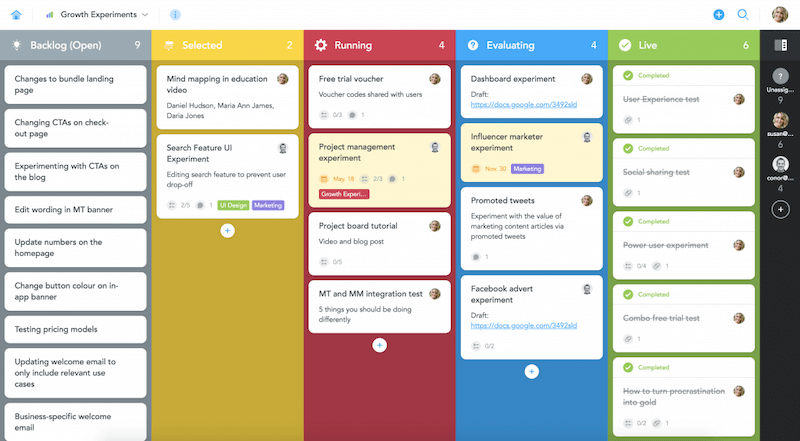
MeisterTask is a free online task management software and a team collaboration tool. It’s helpful in organizing and managing tasks in a customizable environment and easy to adapt to individual needs.
Thanks to Kanban-style project boards, teams can easily streamline the workflow and stay productive. Every task is available on board, so you don’t have to hold too many status meetings, you can see the progress in one place. It is definitely easier to collaborate when you use this kind of software and manage tasks online.
Integrations: This task management tool offers integrations with some of the most popular apps for email, communication, dev tools, file storage, and automation. You can also use the Meister Suite with MindMeister (app for project planning and brainstorming) and MeisterNote (a tool for projects and documents).
Available for: MeisterTask is available for web, as a mobile version, for iOS, Android, Mac, and Windows, making it easier to use on the go.
Pricing: The free version is available with core task management features for single users. Pricing starts at €13.50 per user/month.
3. Bitrix24
Best for: managing complex projects
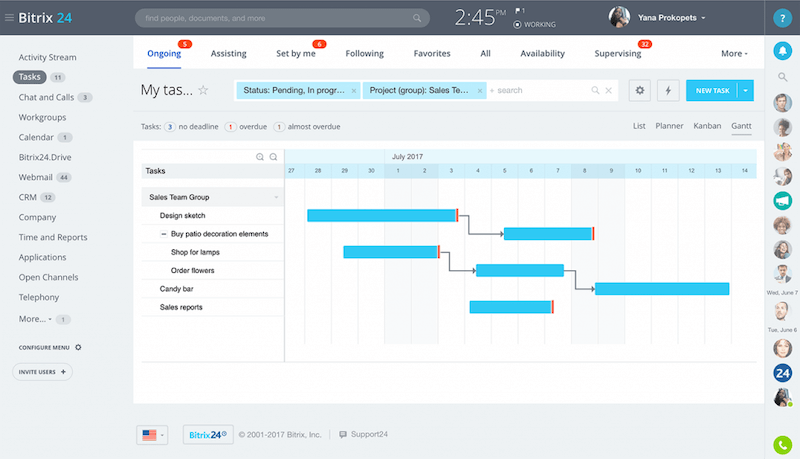
Bitrix24 is a social enterprise platform, which helps manage many aspects of daily operations. It offers a whole range of project management features for efficient workload management. Bitrix24 makes it easier to plan your tasks, with project resource management options and an interactive Gantt charts view.
It has many good task management software features like task dependencies, employee workload management or reports. This tool is recommended by many project managers, but it is better for a bigger team. It can be just a free task manager, but this software also offers many additional features like time tracking, CRM, document management, or contact center.
However, this task management tool can be difficult to learn, so it’s best for demanding users.
Integrations: you can add new functions and features to your Bitrix24 account from the Marketplace for a more streamlined workflow.
Available for: web, desktop (Windows, macOS, Linux), mobile (Android, iOS).
Pricing: Bitrix24 is free for unlimited users. The plan includes most of the features, however, in a basic scope. You can use the task and project management features and communicate with your teammates. The lowest paid plan is Basic at US$61 per organization/month/billed monthly.
4. Hitask
Best for: basic task management and minimalistic project management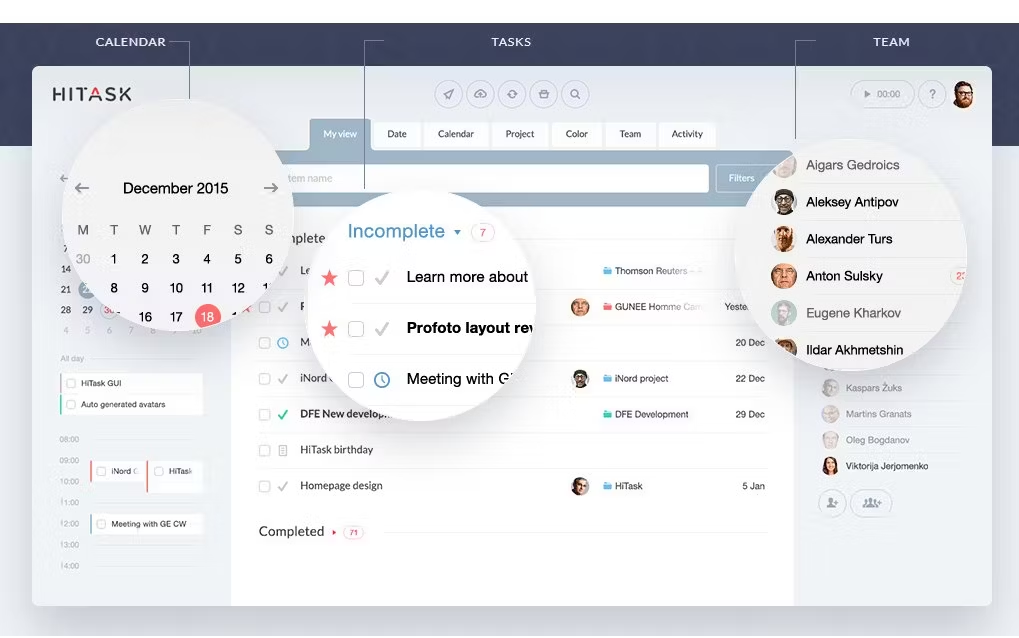
Hitask is a task management platform that makes it easy and quick to set up a new project, assign and share tasks, use a file library and a shared calendar, send and receive notifications, and synchronize the workflow across all devices.
The tool is easy to use and allows you to manage tasks also on mobile. In Hitask, you can also attach files to tasks and projects, manage permissions on the user level, assign tasks to team members, create a task from an email, create subtasks, and get a quick tasks overview on a single-screen dashboard.
Hitask gives you access to shared task lists, projects, and calendars for easy reference and a clear overview of tasks. You can also communicate with your team using a team chat, without the need to leave your workspace. For more options, you can integrate Hitask with Google Calendar and Outlook.
Integrations: HiTask doesn’t offer integrations with external tools except for Google Calendar, Microsoft Outlook and Zapier.
Available for: web, iPhone, iPad, Mobile and Desktop.
Pricing: Hitask is a free task management app for up to 5 users. The free plan doesn’t limit the number of tasks and projects, so as long as you work in small teams, you can work on multiple projects at the same time.
5. Trello
Best for: working in Kanban board style
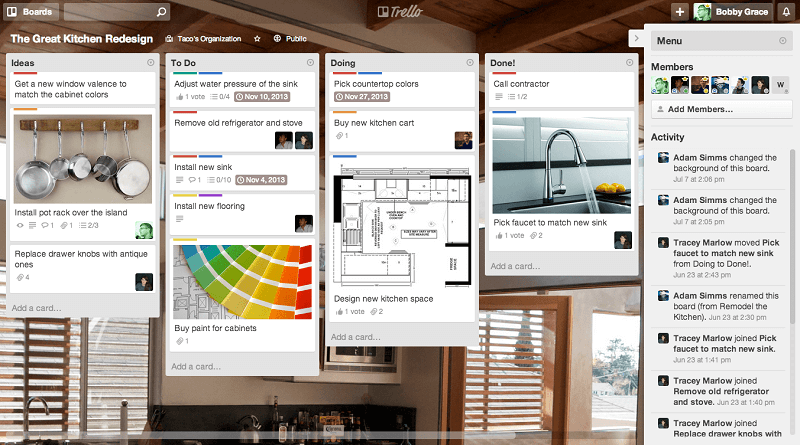
Trello is a visual task management tool facilitating collaboration and helping streamline the project management process in a company. It’s user-friendly and intuitive, which makes it a frequent choice among task management solutions.
This simple free task manager is based on Kanban boards and allows you to work in a team on different tasks. Every task can be moved from one list to another and can include descriptions, files, comments, and checklists, and many other elements necessary for project tasks. Trello also offers many power-ups, i.e., time tracking for every task.
Trello is a great task management software that can help you prioritize tasks for less complicated projects.
Integrations: In the free version, you can choose unlimited power-ups per board from a variety of available ones. You can also check TimeCamp integration with Trello for powerful time tracking and rich productivity reports.
Available for: web, desktop, and mobile apps.
Pricing: Trello has a free plan that doesn’t offer all the task management capabilities.
6. Todoist
Best for: minimalistic task management with to-do lists
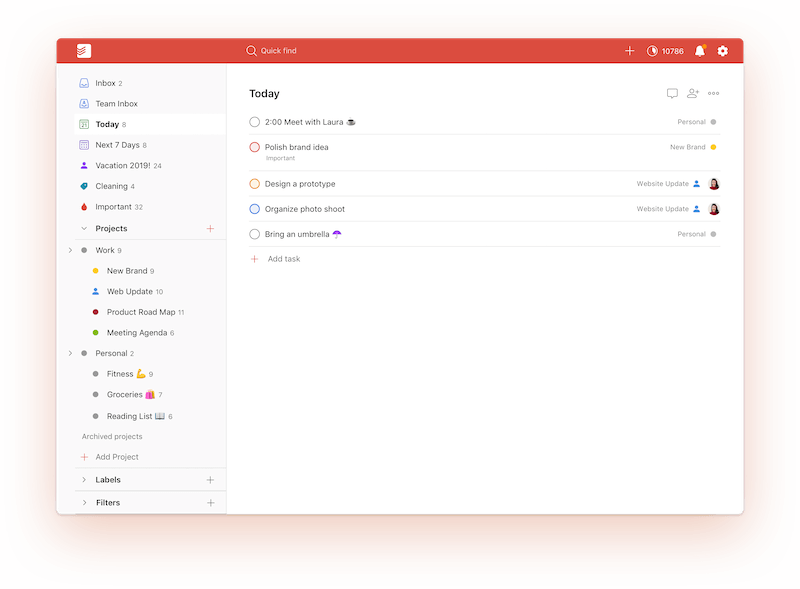
Todoist, probably the most popular app for creating to-do lists, makes it easy to plan and assign tasks effectively. It allows you to share your projects and collaborate with your colleagues.
It’s a basic task management software but very intuitive and has an efficient notification system, so it might be handy if you want a simple tool to help you get organized and work on tasks like a pro. It’s not a very complex task management solution, but it’s useful for students and small teams to keep tasks in one place.
Integrations: Todoist integrates with some of the most popular productivity and project management software.
Available for: web, desktop, and as a mobile app. You can also use it with your wearables, and as email or browser extensions.
Pricing: The free plan offered by Todoist is just enough for small teams and companies, as it allows access for up to 5 people per project.
7. TaskQue
Best for: tracking daily progress of all your projects in an independent tool
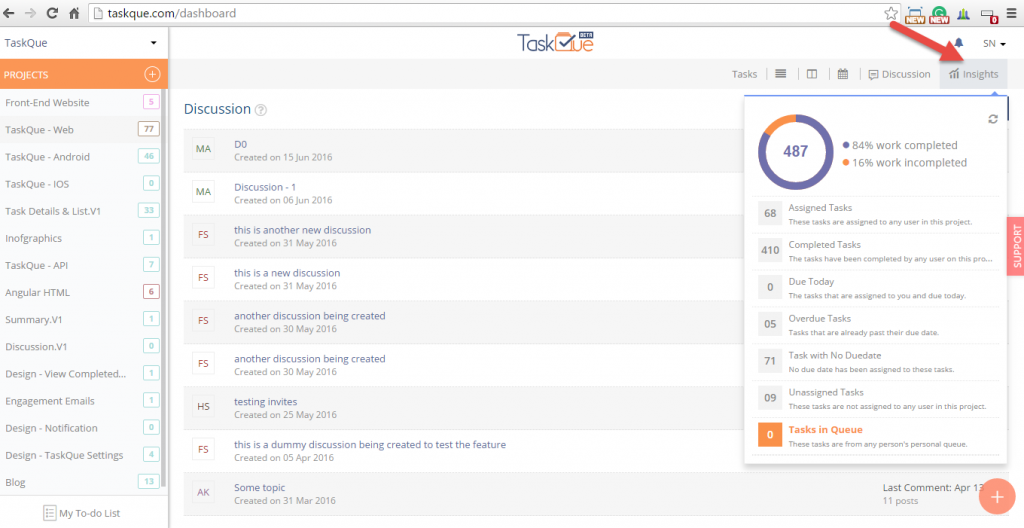
TaskQue is a set of collaboration tools designed to increase your productivity. As your online task manager, it lets you focus on your work and stop worrying about missed deadlines. With TaskQue, you can automate the task assignment process and use your resources to maximize your productivity.
You can also get a quick overview of a project with a summary and insights. TaskQue allows teams to work smarter and minimizes the organizational activities of the project managers.
Integrations: If you’re looking for seamless integration with other tools, TaskQue may not be the best choice as it only integrates with Slack, Google Docs, and DropBox. However, it’s a good stand-alone solution to organize tasks for your small team in one platform.
Available for: web, and as a mobile app for iOS and Android.
Pricing: The free plan is available for teams of up to 10 users and offers basic features. The feature of queue manager gives you the possibility to manage and rearrange your priorities, which greatly facilitates managing the workflow. The task management feature is based on Kanban, so it’s easy to plan and track projects.
8. Airtable
Best for: creating personalized workflows with individual task managers
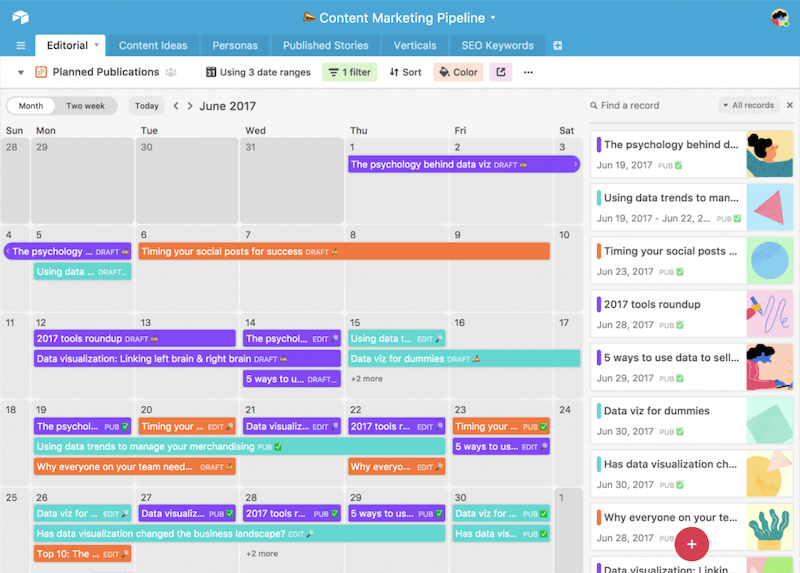
Airtable is a cloud-based task management tool and collaboration platform in the form of a spreadsheet that makes all the information you need clearly visible in a table and easy to find thanks to the user-friendly interface. You can plan your project, add all the necessary details, and then group and organize your records however you choose.
It’s a versatile tool that allows you, to organize and track information, collaborate with others, and create customized solutions for various needs. It allows you to create personalized structures, track statuses, and attach relevant files, enhancing coordination within your team. The added benefits of automation, calendar views, and mobile accessibility make it a versatile choice for boosting productivity in your projects.
Integrations: You can easily integrate Airtable with multiple third-party apps, or use Airtable’s API. You can also use the newest AI feature to improve your workflows and task management. Additionally, you can choose from lots of templates to personalize your projects.
Available for: web, desktop, and mobile.
Pricing: The free plan includes an unlimited number of bases (databases that can have multiple tables and views) and allows to create 100 records per base (a row in a spreadsheet). Each base has 1GB of attachment space, so you can also add files to your projects and make them available to all teammates. However, you don’t get the Gantt charts, which can make it problematic if you want to fully use the tool.
9. Pipefy
Best for: managing and optimizing complex workflows and processes within a business or project environment
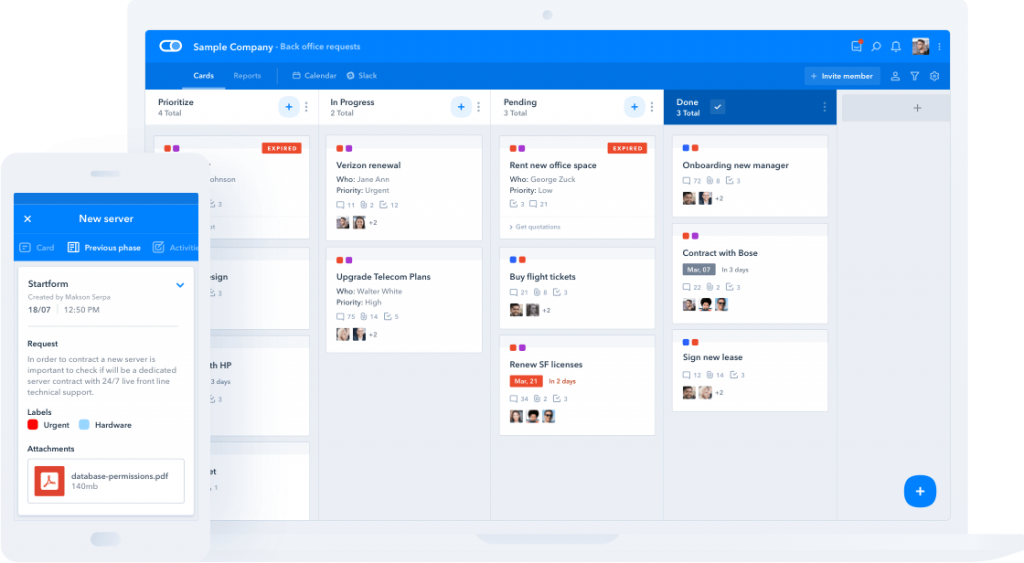
Pipefy is an AI-driven work management platform that helps organize and control your task flow. You can easily create task assignments, delegate activities, set up deadlines, track performance and keep up to date with the progress of your team’s projects.
In Pipefy, each project is divided into phases and managed based on the Kanban method. You can decide what phases you need to run your projects in a smooth way. Pipefy is not only a task manager but also offers more advanced enterprise functions like automations, custom integrations, shareable forms, or task field customization. It allows you to create, automate, and manage workflows in a visual manner.
Integrations: you can integrate the platform with other task management software and apps that can help you improve workflow.
Available for: web, mobile.
Pricing: The free plan offered by Pipefy includes up to 5 processes and is available for teams of up to 10 users. The tool offers basic automations.
10. Asana
Best for: organizing, tracking, and managing tasks
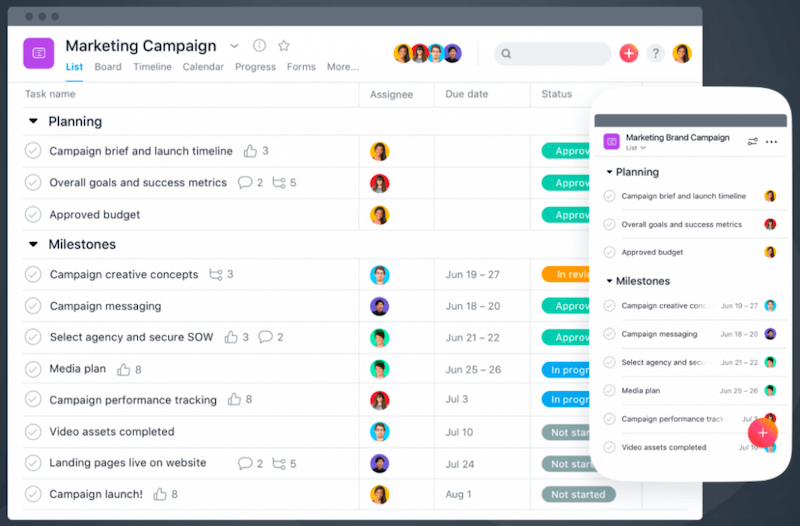
Asana is a popular task management software designed to streamline and enhance collaboration within teams. It helps organize tasks, projects, and workflows, making it easier to keep everyone on the same page.
One of the key features of Asana is its ability to create tasks and subtasks, assign them to team members, and set due dates. This helps in clearly defining responsibilities and deadlines. The platform also allows for file attachments, comments, and conversations within tasks.
Asana provides different views like lists, boards, and calendars, offering flexibility in how you visualize your projects. The tool supports project tracking and progress monitoring, ensuring that everyone stays informed about the status of tasks.
In terms of productivity, Asana can save time by centralizing project-related information, reducing the need for lengthy email threads.
Integrations: Asana easily integrates with plenty of third-party apps.
Available for: all platforms.
Pricing: Free for up to 10 users. It will allow you to manage tasks in unlimited projects and add assignees and to dates to tasks. It is a perfect first step for more organized and professional task management.
11. ClickUp
Best for: managing all types of tasks from one platform
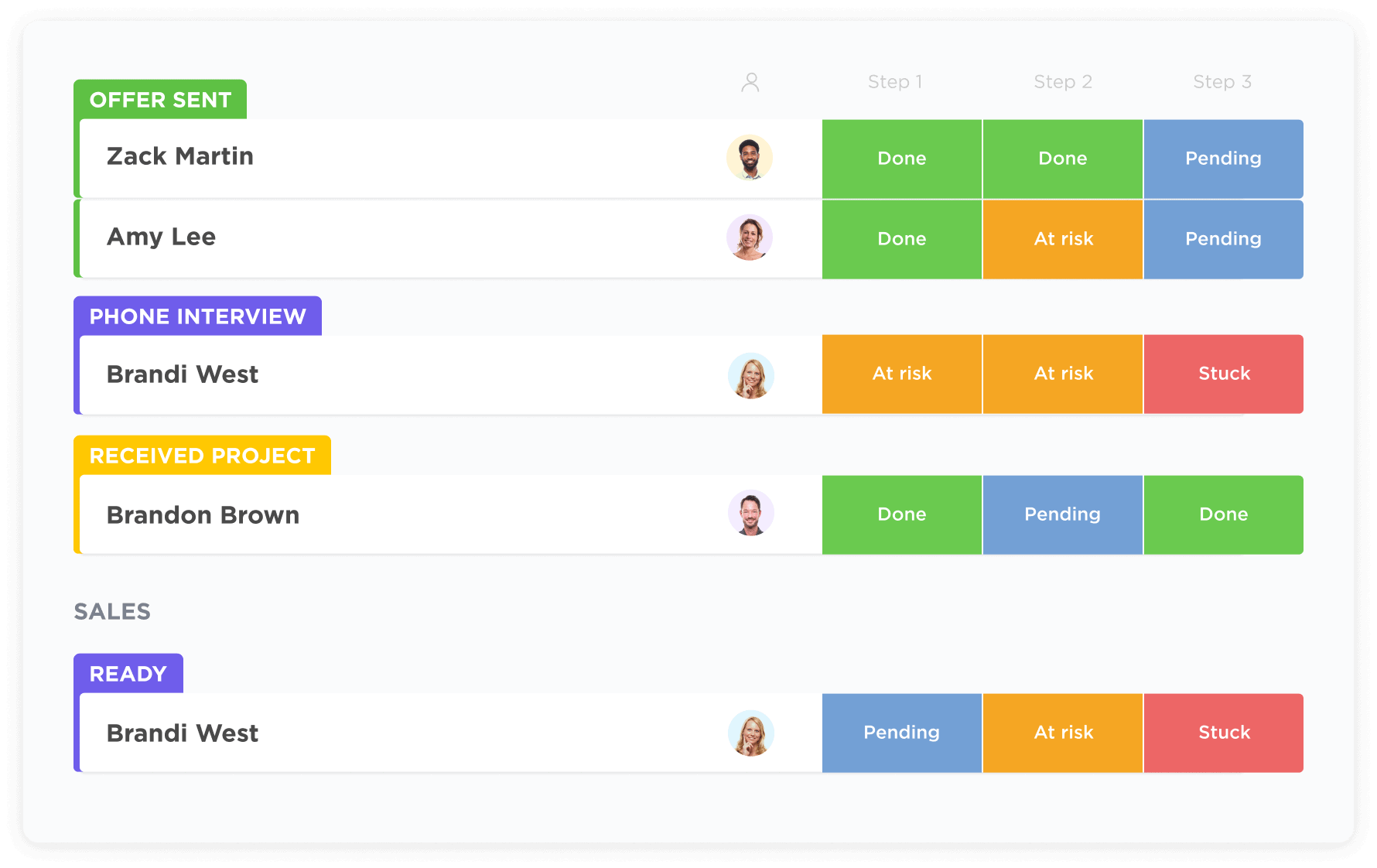
ClickUp is a great task organizer software for all kinds of teams. It helps to manage and organize tasks in one place thanks to multiple, customizable views. This app can replace many other tools you and your team use now. It will also be great for smaller teams because you can choose between less and more advanced views and features to manage tasks smoothly without overwhelming your teammates with too many options.
You can start small by creating tasks, setting up due dates, and assigning them to users. While your projects grow, you can start using more advanced features like spreadsheets, goals, or time tracking.
Integrations: ClickUp offers plenty of integrations with almost all third-party apps, including TimeCamp time tracking. There are also templates and API, so you can better customize workflows
Available for: all platforms.
Pricing: ClickUp can be your free task manager because it offers a free forever plan with limited functionalities and storage. Unlimited Plan with all features is $7 per user per month, and Business Plan is $19 per user per month.
12. Clockwise
Best for: turning emails into tasks
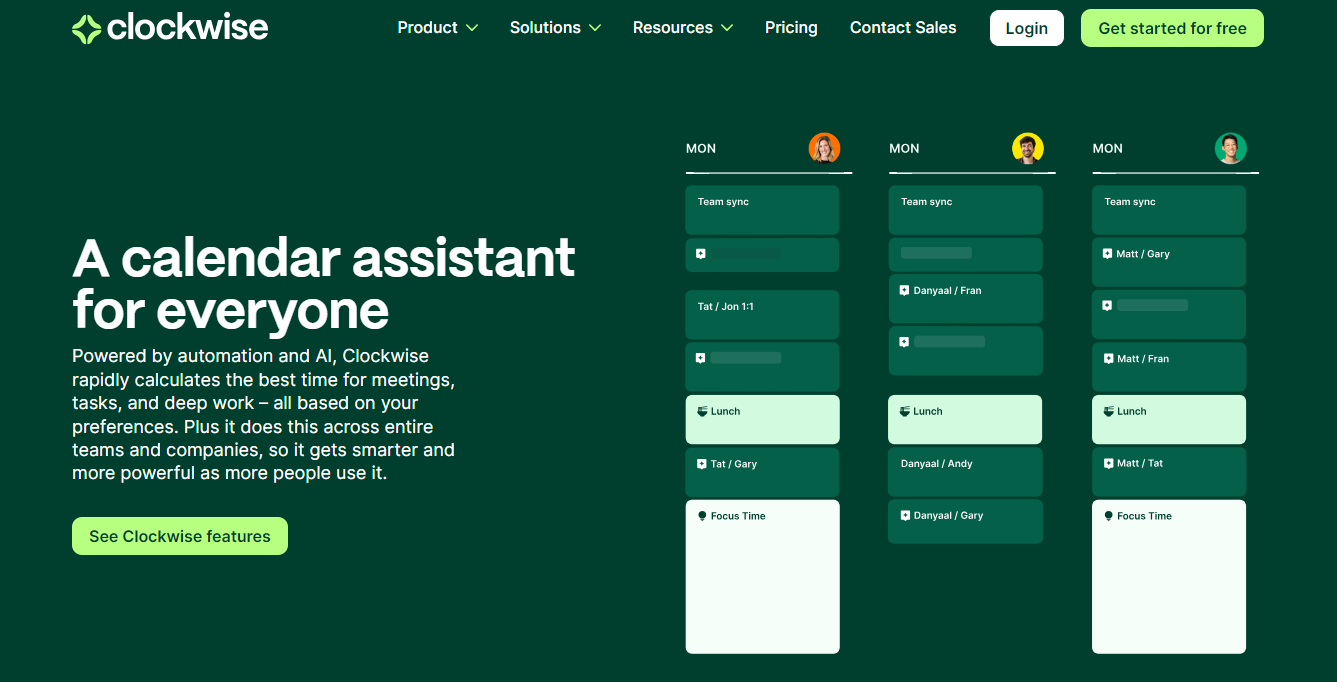
Clockwise is a smart calendar and scheduling app designed to optimize your time and enhance productivity. Clockwise uses AI to analyze your calendar and intelligently reschedule meetings to create more focused work time.
The app helps in 4 steps:
- Automated calendar management: Clockwise optimizes your calendar by intelligently rescheduling meetings to create uninterrupted work blocks, aligning with your priorities.
- It prioritizes focus time, ensuring you have dedicated periods for deep work without interruptions.
- It offers collaborative scheduling features, making it easier to find suitable meeting times that work for everyone.
- Provides insights and analytics into your time usage, helping you understand how you’re spending your work hours.
Integrations: Clockwise integrates with various calendars and with Asana, Zoom, and Slack.
Available for: web only.
Pricing: Clockwise is free for unlimited users but offers limited functionalities.
13. Monday
Best for: building simple workflows with task dependencies
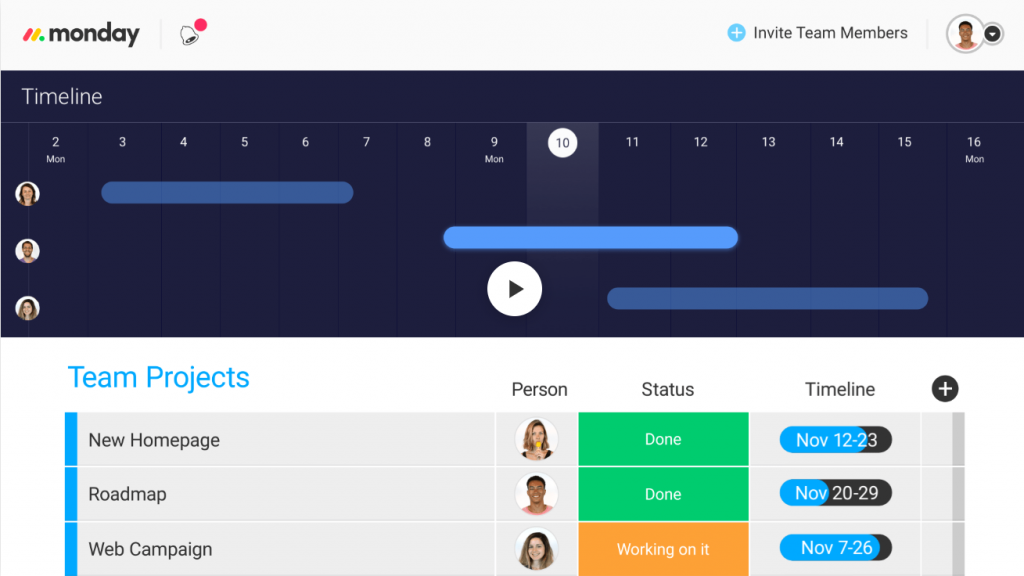
Monday is a powerful tool for task management and collaboration. It’s designed to streamline workflows, enhance team communication, and improve overall productivity. With Monday, you can create and manage tasks, set deadlines, assign responsibilities, Kand track progress—all in one place.
The platform offers customizable boards, which can be adapted to fit your specific project or team needs. It’s a versatile solution suitable for all industries and project types. Whether you’re working solo or with a team, Monday provides a visual and intuitive interface that simplifies task tracking and project management. It also helps to prioritize tasks.
Integrations: One of Monday strengths lies in the ability to integrate with other tools and apps, allowing for a seamless workflow. This can enhance your productivity by reducing the need to switch between different platforms.
Check out TimeCamp integration with Monday and improve your time management!
Available for: all platforms.
Pricing: Monday is free for two seats, which makes it the best option for individuals and freelancers or really smallish teams.
14. Taiga
Best for: Agile project management
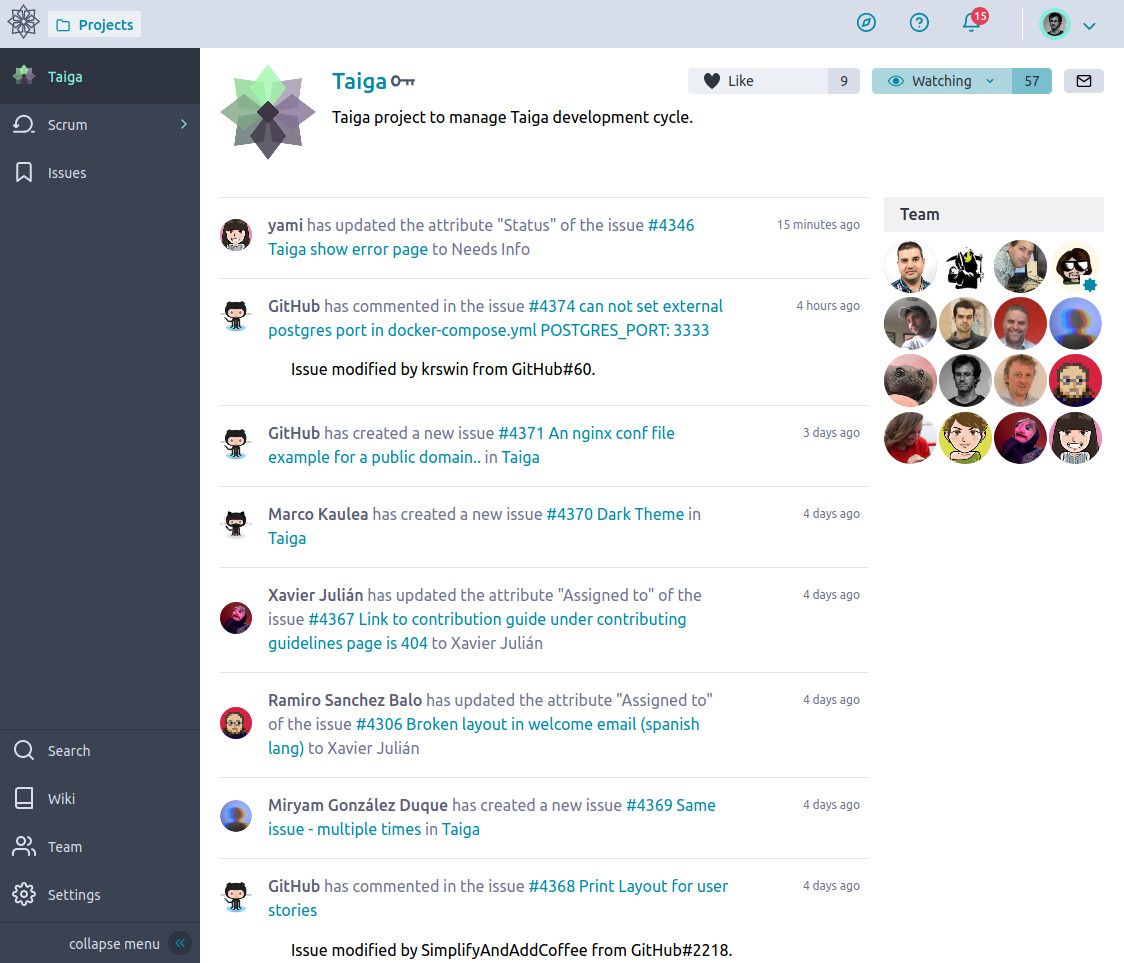
Taiga is a project management tool most suitable for software development teams and companies working with an Agile framework. It helps to organize, plan, and task progress on a daily basis. Its flexible features allow teams for smooth interaction: there’s Agile planning with prioritizing tasks and deliverables, adapting workflows for different project structures, integrated and complete issues/bug tracking, or dashboards with insights.
The tool lets you divide work and plan the entire project in a simple way. It’s a lightweight solution for teams who need an intuitive app. The scrum functionality makes it possible to break product backlogs into manageable, executable chunks, and prioritize work in short time cycles.
Taiga is most suitable for IT, software development, and technical teams.
Integrations: You can extend Taiga with API, Zapier integrations, or by importing data from other tools.
Available for web only.
Pricing: Taiga is a free task management tool. You can choose to get a Premium version with full support for $70 per month.
15. Miro
Best for: visualization of tasks
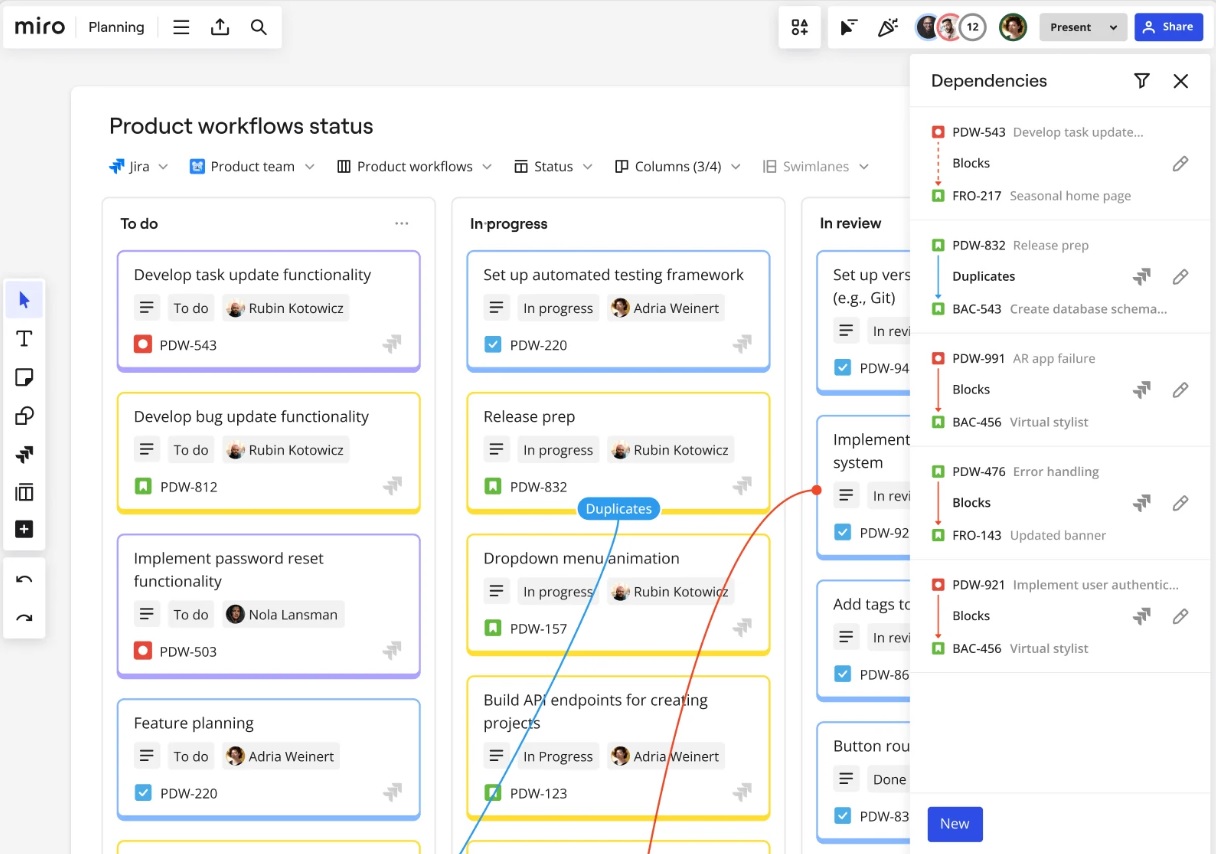
Miro is a task management software perfect for creatives and people who like to brainstorm, share ideas, mindmap, and collaborate in different ways. It goes beyond traditional methods by providing a visual and interactive space for teams to collaborate in real-time.
You can create boards for different projects, add tasks, assign tasks, build automation, and use the drag-and-drop feature for smooth work.
Integrations: Miro offers 130+ integrations with external apps or use API. You can also choose from many helpful project templates.
Available for: web and mobile apps.
Pricing: The free plan is available for unlimited number of users and single workspace with 3 editable boards.
What Other Types of Task Management Software Are Available?
With so many task management software tools available out there, you may find it tricky to choose the right one. On our list of the best task management software, we’ve included the most common types of free apps. Here are all of them based on their application:
- To-do list apps are simple and straightforward, which makes them perfect for individuals or small teams managing daily tasks.
- Project management tools—ideal for handling complex projects with multiple tasks, deadlines, and collaborators. These have more advanced features and allow you for creating different workflows.
- Workflow visualization apps with Kanban or Gantt charts. Help teams manage tasks through different stages.
- Time tracking software—helps in monitoring how much time you spend on each task. Useful for teams of all sizes, especially if you need to track billable time.
- Collaboration platforms help to communicate and access all projects from one place.
- Calendar apps—while not solely task management tools, they help in scheduling and organizing tasks, for example, Google Calendar.
- Enterprise Resource Planning (ERP) Software: Comprehensive systems that integrate various business processes, including task management. These are advanced tools best for larger organizations.
Another helpful resource is project templates. These can be a great addition to your favorite task management tool, especially, if you work on multiple projects, similar tasks, or repetitive tasks.
Tips for Effective Implementation
Even the best task management software may not work for you and your team if you don’t know how to use it. The finest features and popularity don’t go hand in hand with functionality. Opting for the top-notch software doesn’t make it your life savior.
Remember that whichever task management software you decide to choose, it should correspond to your business plan, needs, and style of work and project management methodology.
Here’s what you can do to make the most of your chosen task management software:
1. Define Clear Goals and Objectives
Clearly define your company’s goals and objectives when implementing task management software. Ensure that everyone on the team understands the desired outcomes.
A survey by G2 “State of Software Happiness Report 2019” indicated that “More than half of all employees are unhappy at work because of the software tools they’re using.” Defining your business objectives will help you choose the right task management software with all the necessary features. That way, your team will be more engaged, satisfied, and productive. It’ll also lower the turnover rate at your company.
2. Train Your Team
Provide adequate training to your team members to familiarize them with the software’s features. This training ensures that they can use the software effectively from day one.
3. Customize Workflows
Tailor the software to match your company’s unique workflows and processes. Customization can optimize the tool’s efficiency and alignment with your business and employee needs.
4. Regularly Review and Optimize
Continuously review your task management processes and workflows. Identify areas for improvement and optimize your usage of the software to boost productivity and spot bottlenecks.
5. Potential Upgrades
As your small company grows, you may find that your needs evolve beyond the capabilities of task management software. At that point, you can consider upgrading to the premium versions of these tools. Paid plans often offer advanced features, enhanced support, and greater scalability.
What Is the Best Task Management Software?
There is no one right answer to that question. It depends on the type of work and your preferences. You may need features that are unique to your team and your tasks but for other businesses aren’t necessary. The best way to decide is to do some good research, then test some most promising simple task management software and decide which one will work for you.
Most of the presented task management tools offer a free trial or even a free forever plan with limited features. If you work in a bigger team, you should engage your colleagues in the decision process and allow them to test some task manager apps and give their opinions.
One thing is certain—if you keep your tasks in one place (like task management tools), the work will be easier and more effective.


